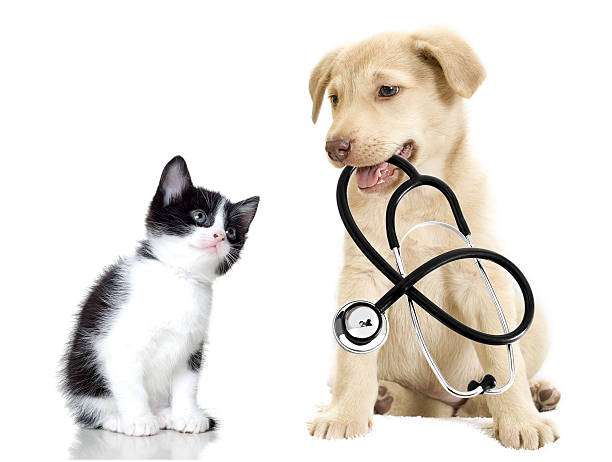Heart murmurs and heart arrhythmias are commonly confused for the same medical condition. In this article we would like to distinguish the difference between the two and discuss what they are in more detail. To start, some basic anatomy and physiology of the cardiac system (the heart) will be discussed in order to further understand heart murmurs and heart arrhythmias.
Basic cardiac anatomy and physiology:
The heart is an involuntary muscular organ that is located in the thoracic (chest) cavity. This important organ has multiple different functions and internal workings that make it more complex, although it has 1 main purpose – and that is to re-oxygenate blood and pump it throughout the body for use. Without this vital function, life is not sustainable. Within the heart, there are 4 different chambers and 4 separate valves.
The valves help to control the circulation of blood between the heart chambers. When blood first enters the heart it is deoxygenated and it must circulate through the first 2 chambers of the heart (right atria and right ventricle) and then enter the lungs to pick up more oxygen. After this, the oxygenated blood will circulate back through the remaining 2 heart chambers (left atria and left ventricle) so that it can be ejected from the heart via the aorta and freshly oxygenated blood can be circulated throughout the body.
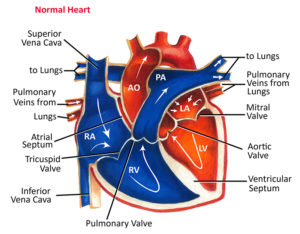
What is a heart murmur?
A heart murmur is referred to the sound of turbulent blood whooshing through the separate heart chambers – this sound can be heard with a stethoscope and can either be congenital (present from birth) or acquired later in life. This sound can be often described as a “washing machine” sound upon auscultation (listening) of the heart. If no heart murmur is present, this sound should not be heard and heart beats should sound more like a crisp “LUBB-DUPP,” which is referred to as a normal heart sound.
The good news is that not all heart murmurs indicate something negative or that a disease process is developing, some heart murmurs can be innocent and are no cause for concern. The tricky part is that most heart murmurs will sound similar upon presentation, whether they are innocent or not
One of the most distinguishing features of a heart murmur when auscultating the chest is the loudness. The loudness of a heart murmur is graded from 1-6. Grade 1 being a subtle/quiet heart murmur that is sometimes only heard intermittently and over certain parts of the heart, and a grade 6 being a very loud heart murmur that is heard from every point of the chest. However, the loudness does not necessarily indicate the severity of disease.
The location of where the murmur is heard can also be helpful in diagnosis. Sometimes the murmur can only be heard when listening to a certain part of the heart (for example the left or right atrium or the left or right ventricles) – this helps to localize where the murmur is originating from and in medical terminology is referred to as the point of maximum impulse or PMI for abbreviation.

What are the symptoms of heart murmurs?
Pets often will not display any signs of a heart murmur – they are typically discovered as an incidental finding during an annual physical examination. Although, if your pet has a heart murmur, your veterinarian will also ask questions regarding the symptoms of your pet and whether or not they are experiencing symptoms related to heart disease. The answer to these questions will give your veterinarian a better idea of how serious the issue at hand may be and how long the issue has been present. Some clinically observed signs of patients suffering from cardiac disease may include low tolerance for physical activity, heavy breathing/panting when resting, coughing, fainting, weight loss and decreased appetite.
If more of a diagnostic workup is needed, one of the most effective ways to tell if a heart murmur is innocent or pathological is by evaluation with an echocardiogram. An echocardiogram is an ultrasound of the heart that can visualize its internal workings and valvular functions.
Potential Innocent causes of heart murmurs that do not impact health:
- Large breed dogs when they are growing: Sometimes the turbulence of the blood can cause a more distinct whooshing sound in larger breeds when they are still growing – this can be noticed at a young age and will usually resolve by the time they reach about 6 months of age. If it continues past this point, further testing is warranted.
- Stress/over excitement or panting: If a potential low grade murmur is heard for the first time and the pet is very stressed or excited at time of visit the veterinarian may have the pet come back in a few weeks to reassess and see if the murmur is still present.
Potential pathological causes for heart murmurs:
- Valvular defects: Some valvular issues may include valves that don’t allow enough blood through them (stenosis), thickened valves, or those that do not fully close properly and allow blood to leak backwards instead of forwards (regurgitation).
- Cardiac shunts: a cardiac shunt refers to improper blood flow between the heart chambers or blood vessels
- Septum defects (hole in the heart): A hole in the heart’s severity will typically depend on location and how large the area affected is.
- Dilated cardiomyopathy: This refers to enlarged chambers of the heart and is more common in dogs. When these chambers enlarge it is more difficult for the heart to pump blood effectively.
- Hypertrophic Cardiomyopathy: A disease that thickens the walls of the heart and causes it to be less effective at circulating blood. This disease is more common in cats.
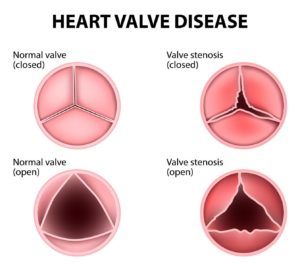
The prognosis for these conditions each depends on the individual pet and condition. Please ask your veterinarian if you have any further questions regarding the above conditions mentioned or others.
What is a heart arrhythmia?
On the other hand, a heart arrhythmia refers to an abnormal heart rhythm. When this occurs, the heart may beat too slow, too quickly or skip a beat. This can be heard utilizing a stethoscope or visualized on an electrocardiogram (ECG) machine.
During a normal heart beat, an electrical signal is generated and issued from the Sinoatrial (SA) node, which is also known as the pacemaker of the heart. This node consists of a specialized group of cells located in the right atrium of the heart. Once the SA node generates an electrical signal, it will then travel through the upper portion of the heart causing the atria to contract, and then will continue to travel downwards until it reaches the atrioventricular (AV) node which is located at the bottom of the right atrium. This node continues to send the signal throughout the lower portion of the heart and will cause the ventricles to contract and circulate blood throughout the body. The timing of these signals are important and will determine how fast or slow the heart will beat and are controlled by a few different factors. When these electrical signals are disturbed, it can cause an irregularity in the heart beat, also known as an arrhythmia.
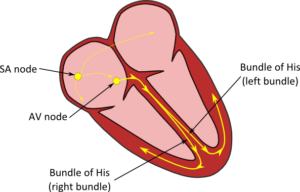
Some heart arrhythmias can be normal and no cause for concern. For example, most dogs will exhibit a sinus arrhythmia. This means that whenever the dog breathes in, the heart will beat faster and slow down as they exhale. On the other hand, some types of arrhythmias may be worthy of concern and should be further evaluated.
What are the symptoms of arrhythmias?
Symptoms of an arrhythmia are not typically displayed unless it is abnormal, or sustained for a long period of time. In some cases, if there is an underlying arrhythmia that is being caused by or causing heart disease, clinical signs of heart disease may be displayed such as lethargy, reduced exercise tolerance, fainting, wobbling, etc… Some arrhythmias may also not be related to heart disease at all, other symptoms to raise concern may include vomiting or decreased appetite.
If your pet is experiencing any of the above symptoms for an abnormal amount of time it is advised to seek medical attention from your veterinarian.
What are some causes of heart arrhythmias?
There are many different causes of heart arrhythmias, some common ones are:
- Anemia
- Structural heart disease
- Disease of the spleen, liver, GI system or brain
- Disease of the SA or AV node
- Trauma
- Cancer
- Age
- Genetics
There are multiple different types of heart arrhythmias that can be caused by any of the above factors. To officially diagnose a heart arrhythmia and determine which type is present, your veterinarian will listen to your pet’s chest with a stethoscope and also evaluate the electrical signals on an electrocardiogram (ECG) machine.
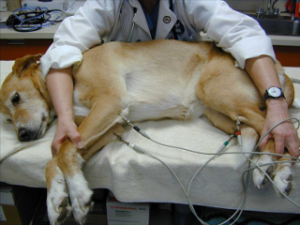
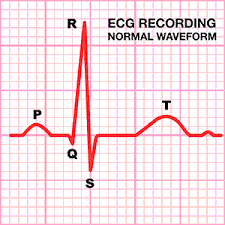
The prognosis of heart arrhythmias primarily depends on its cause and treatments available. In more severe cases, if the electrical signals will not regulate, a pacemaker can be surgically installed to control the heart’s rhythm artificially. Although not every case has the same severity or treatment plan and should be evaluated individually.
If you have any further questions regarding any of the information above, please do not hesitate to give us a call at 519-893-8937. We would be more than happy to answer your questions or book you in for a consultation with one of our lovely fear free certified veterinarians!


